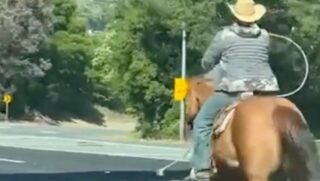Julie Borlaug gets asked all the time, “Can we feed 9 billion people by 2050?” Her answer is always the same.
“Yes, you have to allow us to use innovation, technology, and modern farming to do that,” Borlaug said. “It’s up to the public to make sure we can feed the future.”
South Dakota State University was pleased to host the granddaughter of Norman E. Borlaug, the Father of the Green Revolution, on Wednesday evening as she addressed the controversy surrounding the use of biotechnology in food production and opportunities for the next generation to carry on her grandfather’s mission to feed the world.
A recipient of the Nobel Peace Prize and the Congressional Gold Medal, Norman Borlaug was a warrior against hunger, a teacher, a mentor, but first and foremost, he was a scientist. Borlaug said one of her grandfather’s biggest worries was the anti-science movement — he called them “The Greenies.”
Today, what is driving anti-technology and anti-innovation, is often consumers, Borlaug said.
“The unintended consequences of forcing organics or forcing only a certain type of food and making sure that other governments accept this is we don’t look at the unintended consequences on the poor and what that means to them,” Borlaug said. “I think it is important to sit back and look at our choices, not just from the United States, but is it going to affect the small holder farmer?”
Borlaug said if you look at Africa, they don’t have drought tolerant technology. Only 4 percent of Africans irrigate.
“If we don’t provide them that science because ‘I personally don’t’ believe in it’, we are just giving in to the cycle of poverty and hunger,” Borlaug said.
Borlaug said we have a new strain of fact resistant humans, and as an industry we have to think about transparency and communicating why modern technology and modern agriculture is good for the farmer and the consumer.
As a mom, Borlaug often communicates about items that are important to her — why she chooses the foods she buys and why she thinks genetic modification is fine. She also speaks about the 25,000 people who have died today and what we can do to stop that, and how one out of every four children are stunted due to malnutrition.
“We have a new boss in agriculture and that is moms, bloggers, foodies, and yoga instructors who have an online certification in nutrition,” Borlaug said. “They are our new boss and they speak louder than we do and they are full of inaccurate information but they are powerful when they speak.”
From popular misconceptions and the romanticized view of farming to market confusion (our grocery shelves full of mislabeled products such as vegan, gluten-free green beans, GMO-free salt, and GMO-free wheat) and sensationalism from PR campaigns such as Greenpeace attacking Vitamin A fortified rice for Africa and Asia, agriculture has many challenges today in educating the public.
“I always say you can’t be anti-hunger and anti-technology,” Borlaug said.
Following the Green Revolution model, feeding 9 billion people by 2050 will be up to the actions of the next generation of students – the people her grandfather called “hunger fighters.”
As Borlaug pointed out, her grandfather was only in his 30s when he had his first breakthrough so age should never be a deterrent. Borlaug said if her grandfather was here today, he would want to tell the students:
- Believe in yourself- be passionate, be optimistic, negativity will never get you anywhere.
- Challenge the order of things, be bold, and quick to act, but have the science to back up your research.
- Strive for excellence — don’t settle for mediocrity.
- Know your weaknesses.
- Have a mentor.
- Failure is not an option.
- Actions speak louder than words.
- Always be prepared to learn from others.
- Don’t ever discuss personal, political, or religious beliefs. It will not serve you well. If her grandfather would have brought any of his political beliefs up, the Green Revolution would never have happened. No one ever knew how he voted.
- Develop a thick skin.
- Don’t be blinded by extremists and always respect those on the opposite side.
- Need unconventional partnerships in innovation.
- Need bold, young minds that think differently.
When her grandfather was on his death bed, he told his family, “I have a problem. Africa. I failed Africa.” They reassured him that he has trained thousands of hunger fighters that will carry on his work. Borlaug said there is no reason students today can’t continue his mission.
“All of you have the potential to change the world, to be a Norman or Norma Borlaug,” Borlaug said.



